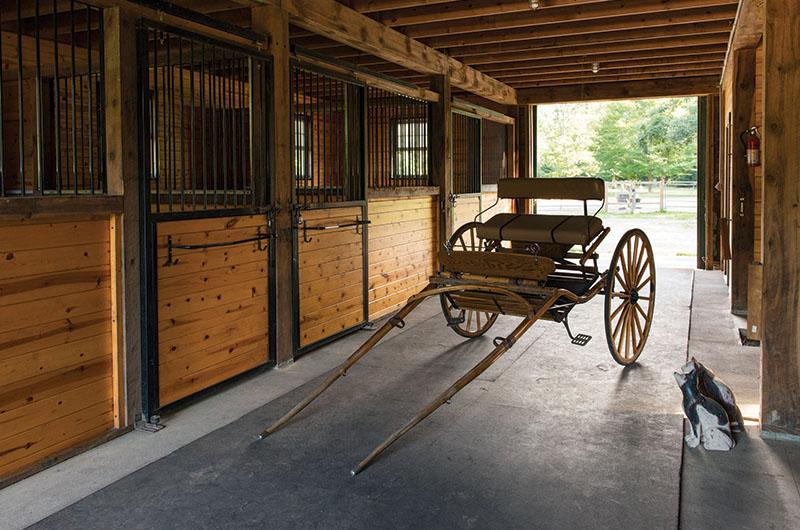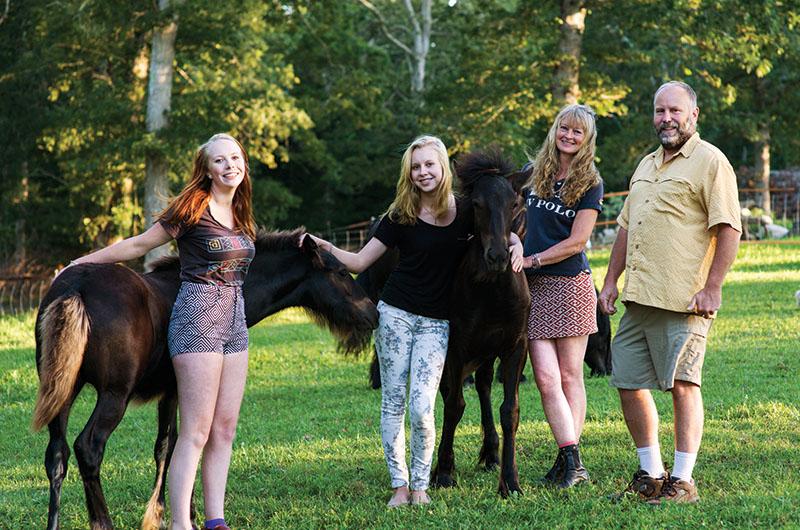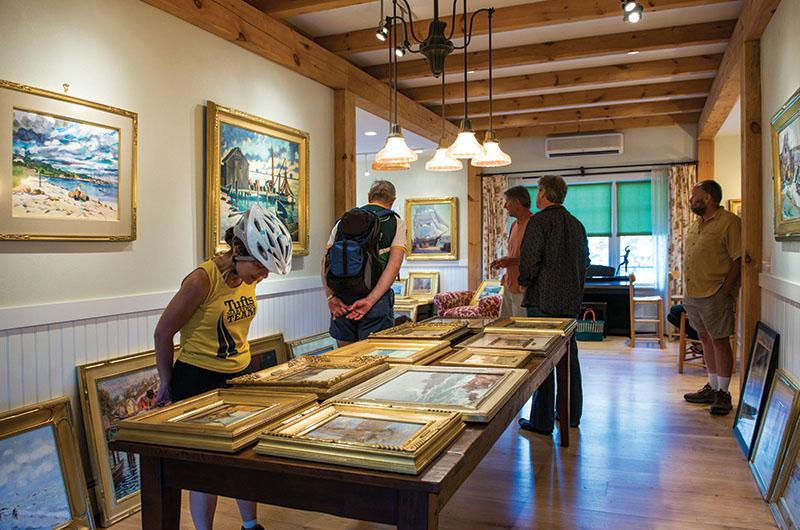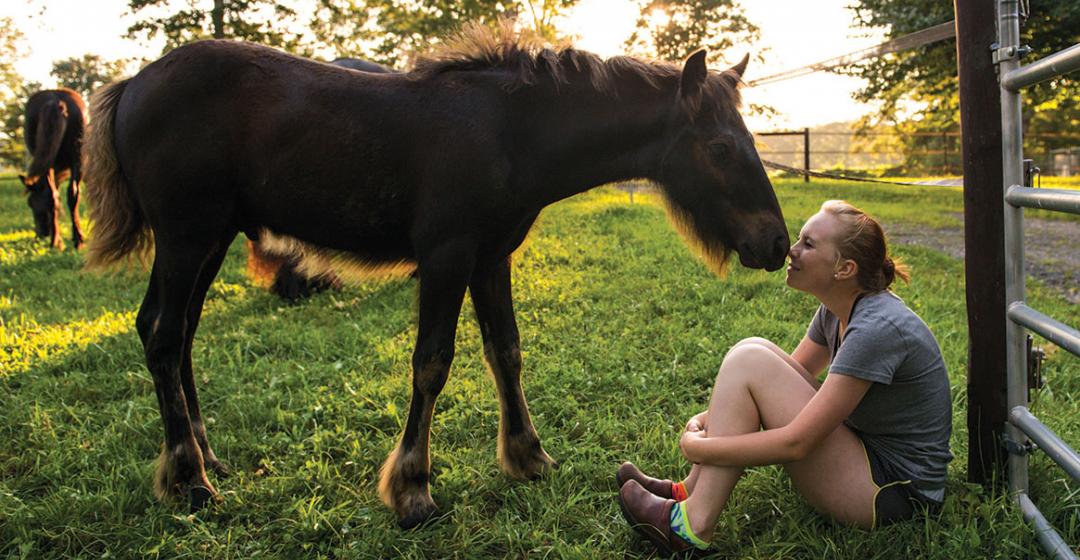With a house full of fine art and fields full of ponies, pigs, and goats, Cynthia and Scott Bermudes, along with their teenage daughters Paris and Anais, are surrounded by the things they love. It’s as idyllic as it sounds, all the more so because the family created the place from the ground up out of ten acres of West Tisbury woodland. Now nearly twenty years in the making, Scottsdale Farm, tucked off of Indian Hill Road, is the ongoing product of twin passions: his a lifelong one for collecting art, and hers a slightly more recent one for raising rare livestock.
Scott grew up on the Vineyard, but the couple met in a scuba diving class at Oregon State University, where he was majoring in agriculture and animal science and she was studying fashion design and merchandising. They moved to the Island in 1986, married in 1989, and set about building a life here. For nearly ten years Cynthia ran her own fashion and alterations business in Vineyard Haven – the Fitting Room – before stopping to raise their daughters. Scott, meanwhile, developed a reputation as a master builder and home designer.
They were living in Aquinnah in 1995 when a large parcel of wooded land came on the market in West Tisbury. With two other families they bought it, subdivided it, and sold some of it, keeping ten acres for themselves, but not necessarily with the intention of moving there. It wasn’t until three years later that Scott built the first building, a two-story post-and-beam barn-styled workshop for his firm, Scott Bermudes Builder.

Enter the ponies. Although Cynthia had never owned or cared for a pony, she liked the idea of eventually getting one for her young daughters. Planning ahead, Scott added an elegant, vintage-style barn with an adjacent arena. “We didn’t even have a pony when the barn was built,” Cynthia said recently, laughing. “I wanted a backyard pony, an easy keeper that the girls could play with.”
At the 1999 Equine Affaire horse show in West Springfield, Massachusetts, there were no Dales ponies for sale, but there was an intriguing brochure about the breed. “We went online, but there were none to be found,” Cynthia said. The British, she discovered, are very particular about their exports. Mostly black with muscular necks and flowing, silky manes and tails, Dales are a hardy breed that worked for generations on farms and even in coal mines. They nearly became extinct during World War II, however. Taken to war by the army, they rarely came back, and only a strict stallion licensing program in recent decades by the Dales Pony Society has saved the breed.
Eventually, the Bermudeses found a Dales mare in Vermont named Lady Rebecca. “We put Anais on the pony and bought her, and it just went from there.” They enclosed the entire Indian Hill Road property with fencing, and built a cross-country course around the perimeter. Cynthia began buying Dales to train and sell, and now sells about three ponies each year to buyers both locally and as far away as Minnesota. Over the years ponies came and went; at one point the herd numbered thirteen, today there are five. “I knew nothing about horses,” she said of her success, “but it speaks for the breed.”
The whole family eventually got involved, with Paris and Anais competing regionally in dressage and eventing – a combination of dressage, stadium jumping, and cross-country. (Anais, a junior at Martha’s Vineyard Regional High School, has put riding aside for now to pursue dance; Paris, a freshman at Furman University in Greenville, South Carolina, still rides competitively.) Scott also competed in what are called “combined driving events,” which consist of dressage, obstacle courses, and a cross-country marathon.

Meanwhile, they were still living in Aquinnah. “It sounds silly, but we got tired of the commute,” is how Cynthia described the decision to move to West Tisbury. In 2005, Scott converted the second floor of his workshop into a two-bedroom home, adding a master bedroom suite and den in 2011. He also added a carriage house with a two-bedroom apartment over it.
As if a herd of ponies weren’t enough to keep her busy, somewhere along the way Cynthia began raising Boer goats, a large meat goat that can weigh up to 340 pounds. Next came Lollipop the pig, who had “an unsupervised sleepover” at Native Earth Teaching Farm last August that produced a dozen piglets. And then there’s the gardening: she plants 1,000 tulip bulbs every year. “I buy them by the hundreds and plant them all within a few days,” along with dahlias, sunflowers, and some annuals “that I just pick and give away,” Cynthia said.
Scott also has collecting in his blood. “I come from a family of antiquers and I’ve always collected,” he said. His side business, Indian Hill Fine Art, specializes in buying and selling nineteenth- and early twentieth-century land and seascapes either by Vineyard artists or those who painted on the Island. Among the artists he collects are former summer residents Percy Cowen, who was West Tisbury painter Allen Whiting’s grandfather, Loïs Mailou Jones, and Thomas Hart Benton.
“All the paintings have a story,” he said, “the most fun thing is to tweak it out of them.” On the walls, familiar Island scenes of the Gay Head Cliffs done in oils might be mixed with a woodcut of Menemsha harbor or an illustration of a ship from Collier’s magazine.During art shows, dining area is transformed into a pop-up gallery where Scott sells his collection of sea and landscapes.

Scott used to sell artwork at the Rotary Antiques Show in Edgartown, but when it ceased operations a few years ago he and Cynthia settled on creating a kind of pop-up art gallery at home. Today, when that transformation is underway, double doors open to a large entrance hall that is normally used as the dining room. Artwork is hung above the wainscoting. The living room and kitchen form a T in the rear, with more room to exhibit. Anything that needs to move gets stashed in the adjacent bedroom. An open floor plan, ten-foot-high ceilings, white oak floors, and exposed spruce beams give the house a casual elegance perfectly matched to the nature of the art. Expansive windows flood the rooms with light, showcasing the pieces.
Scott held his first shows at the farm on two summer weekends last year, and they were a great success. Steve Motyka, a collector from Rhode Island who also creates hand-carved gold leaf frames, brought forty or fifty paintings to add to the sale, and will come again to the sale planned for this coming August.
Until then, when they’re not feeding the animals, the Bermudeses are enjoying the art. Cowen’s Hauling the Pots is prominently displayed on one side of their dining room, with New Bedford artist William A. Wall’s Cuttyhunk Island on another.
“We have too many paintings,” Scott said with a smile. “It’s like the horses.”
To learn more about the ponies, visit theblackdalespony.com. For more about the art, visit indianhillfineart.com.





